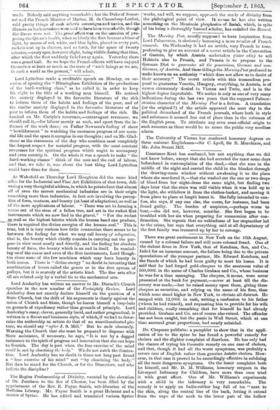At Wakefield on Thursday Lord Houghton did the same kind
office for the Industrial and Fine Art Eshibition of that town, deli- vering a very thoughtful address, in which he pointed out that almost all of even the merest mechanical industries are in their origin something more than industries, in fact arts involving the percep- tion of form, neatness, and beauty (at least of adaptation), as well as of the mere applications of labour. "There was art in forming a canoe out of the stem of a fallen tree, and art in the rudest flint instruments which we now find in the gravel" "For the rudest
avell as the highest fabrics which the human hand can produce, there is required the divine energies of the human soul." This is
true, but it is very curious how little connection there seems to be between the feeling for what we may call beauty of adaptation, that is, the beauty which chiefly consists in carrying out the pur- pose in view most neatly and directly, and the feeling for absolute beauty of form, the beauty which is an end in itself. In remind- ing us of the canoe and even of the flint instruments, Lord Hough- ton chose some of the few machines which may have beauty in both senses. There is "divine energy" no doubt in inventing that combination of levers called the genou or in the first system of pulleys, but it is scarcely of the artistic kind. The fine arts after all are related only by a verbal tie to the mechanical arts.






























 Previous page
Previous page